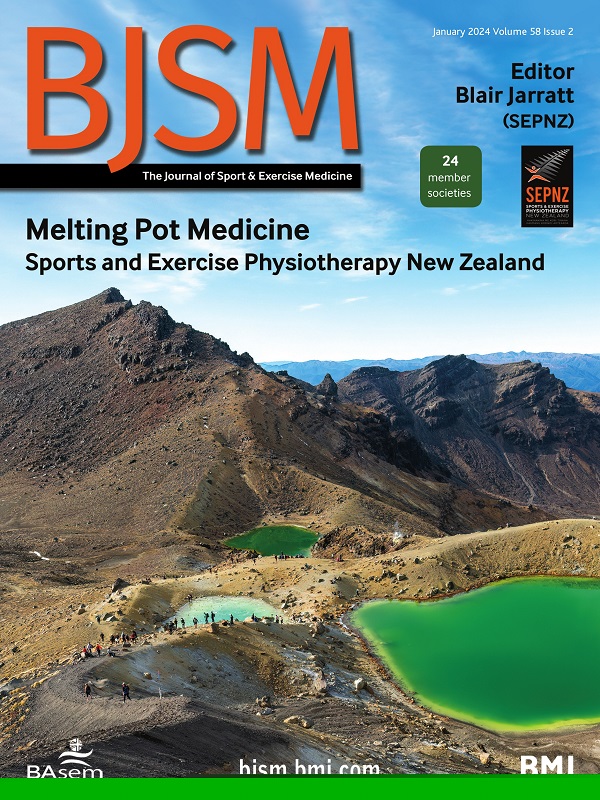Effect of exercise snacks on fitness and cardiometabolic health in physically inactive individuals: systematic review and meta-analysis.
IF 16.2
1区 医学
Q1 SPORT SCIENCES
引用次数: 0
Abstract
OBJECTIVES To evaluate the effects of brief bouts of exercise spread throughout the day, termed 'exercise snacks', on cardiorespiratory and muscular fitness, and cardiometabolic health outcomes in physically inactive adults and older adults (aged ≥65 years). DESIGN Systematic review and meta-analysis. DATA SOURCES Seven databases were searched from inception to April 2025. ELIGIBILITY CRITERIA Randomised controlled trials (RCTs) of adults and older adults, comparing exercise snacks with non-exercising controls. RESULTS 11 RCTs (n=414; 69.1% women, mean age 18.7±0.8 to 74.2±5.6 years) were included. Exercise snacks were defined as structured bouts lasting ≤5 min, performed at least twice daily, ≥3 times/week, for ≥2 weeks. The interventions varied in duration (4-12 weeks), frequency (3-7 days/week) and intensity (moderate-to-vigorous to near-maximal). Exercise snacks significantly improved cardiorespiratory fitness in adults (g=1.37, 95% CI 0.58 to 2.17; p<0.005; I2=71.4 %, k=6) and muscular endurance in older adults (g=0.40, 95% CI 0.06 to 0.75; p=0.02; I2=0 %, k=4), with moderate and very low certainty of evidence, respectively. No significant effects were observed for lower limb muscular strength or cardiometabolic outcomes, including body composition, blood pressure and blood lipid profiles. High compliance (91.1%) and adherence (82.8%) rates were observed. CONCLUSIONS Moderate certainty of evidence indicated that exercise snacks improved cardiorespiratory fitness in physically inactive adults. However, evidence for benefits on muscular endurance in older adults was limited, and the current data do not support their effectiveness for improving other cardiometabolic health markers. PROSPERO REGISTRATION NUMBER CRD42024616514.运动零食对不运动个体健康和心脏代谢健康的影响:系统回顾和meta分析。
目的:评估每天短暂的运动(称为“运动零食”)对无运动的成年人和老年人(年龄≥65岁)的心肺和肌肉健康以及心脏代谢健康结果的影响。设计系统回顾和荟萃分析。数据来源从成立到2025年4月共检索了7个数据库。入选标准:成人和老年人的随机对照试验(rct),比较运动零食和非运动对照。结果纳入11项随机对照试验(n=414,女性69.1%,平均年龄18.7±0.8 ~ 74.2±5.6岁)。运动零食被定义为持续≤5分钟,每天至少进行两次,≥3次/周,持续≥2周。干预措施在持续时间(4-12周)、频率(3-7天/周)和强度(中度到剧烈到接近最大)方面有所不同。运动零食显著改善了成人的心肺功能(g=1.37, 95% CI 0.58 ~ 2.17; p<0.005; I2= 71.4%, k=6)和老年人的肌肉耐力(g=0.40, 95% CI 0.06 ~ 0.75; p=0.02; I2= 0%, k=4),证据确定性分别为中等和极低。没有观察到下肢肌肉力量或心脏代谢结果的显著影响,包括身体成分、血压和血脂谱。观察到较高的依从性(91.1%)和依从性(82.8%)。结论中等确定性的证据表明,运动零食可以改善缺乏运动的成年人的心肺健康。然而,对老年人肌肉耐力有益的证据有限,目前的数据不支持它们对改善其他心脏代谢健康指标的有效性。普洛斯彼罗注册号crd42024616514。
本文章由计算机程序翻译,如有差异,请以英文原文为准。
求助全文
约1分钟内获得全文
求助全文
来源期刊
CiteScore
27.10
自引率
4.90%
发文量
217
审稿时长
3-8 weeks
期刊介绍:
The British Journal of Sports Medicine (BJSM) is a dynamic platform that presents groundbreaking research, thought-provoking reviews, and meaningful discussions on sport and exercise medicine. Our focus encompasses various clinically-relevant aspects such as physiotherapy, physical therapy, and rehabilitation. With an aim to foster innovation, education, and knowledge translation, we strive to bridge the gap between research and practical implementation in the field. Our multi-media approach, including web, print, video, and audio resources, along with our active presence on social media, connects a global community of healthcare professionals dedicated to treating active individuals.

 求助内容:
求助内容: 应助结果提醒方式:
应助结果提醒方式:


